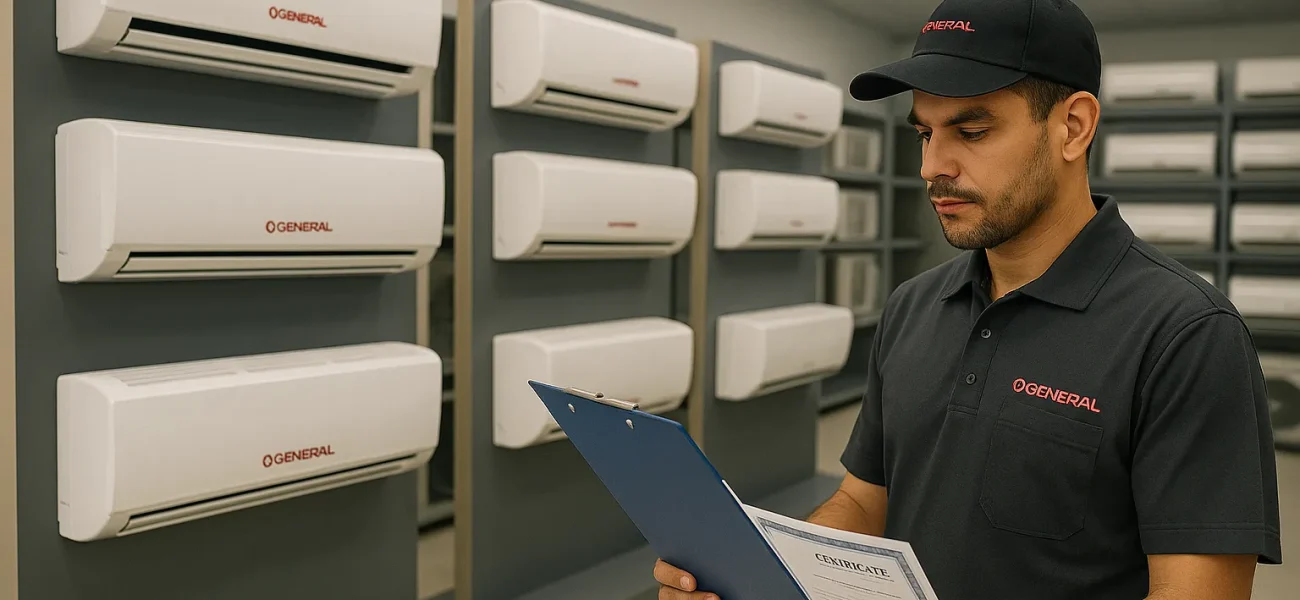When selecting an air-conditioning supplier, certifications are more than just a tick in the box—they’re your guarantee of quality, safety, and compliance with local regulations. For established brands like O General, authorized suppliers must hold specific credentials to ensure that every unit they sell and service meets stringent standards. In this article, I’ll draw on my years of coordinating HVAC installations across commercial and residential projects to explain which certifications matter most, why they’re critical, and how you can verify that your O General AC partner is fully accredited.
Understanding the Importance of Supplier Certifications
Supplier certifications offer peace of mind on several fronts:
Product Authenticity: Only certified suppliers are authorized to stock genuine O General components.
Quality Assurance: Certified entities follow approved handling, storage, and installation procedures.
Regulatory Compliance: Local authorities often require accredited installers to issue warranty-validated service reports.
Safety and Liability: Proper training and certification reduce risks of installation faults that could lead to refrigerant leaks or electrical hazards.
Without these credentials, you run the risk of voiding your manufacturer’s warranty, encountering substandard work, or facing delays when applying for building permits.
Key Certifications Required for O General AC Suppliers
Every region has its own set of regulatory bodies and industry accreditations. However, some certifications are universally recognized and often mandatory for O General’s authorized network:
ISO 9001:2015 Quality Management System: Demonstrates that the supplier maintains consistent quality controls in procurement, warehousing, and dispatch.
ISO 14001:2015 Environmental Management: Ensures responsible handling of refrigerants, minimizing environmental impact.
ISO 45001:2018 Occupational Health and Safety: Confirms a safe working environment and proper risk assessments for technicians.
Manufacturer’s Distributor Authorization: Direct approval from O General confirming the supplier’s status as an official partner.
In the UAE, local bodies like the Emirates Authority for Standardization and Metrology (ESMA) also require AC suppliers to hold a valid ESMA certificate and a “Conformity Assessment” mark on all units. If you’re evaluating a partner tagged as an O General ac uae distributor, make sure this documentation is current and visibly displayed.
Regional and Local Certification Bodies in the UAE
Since each emirate may have slight variations in enforcement, it pays to understand the local landscape. In Dubai, for instance:
Dubai Municipality’s Building Regulations: Technicians must pass the Certified Air Conditioning Competency test to install or service units in residential and commercial zones.
DEWA (Dubai Electricity and Water Authority): Requires approved contractors to hold a DEWA connection permit, ensuring installations comply with energy efficiency directives.
Outside Dubai—say, in Sharjah or Abu Dhabi—regulations come under respective municipal authorities, but many of the fundamental requirements overlap. When searching for a supplier, check their website and brochures, and feel free to request scanned copies of their certificates for verification.
The Role of Authorized Dealers in Certification Compliance
O General’s authorized network of dealers and service centers play a pivotal role in upholding standards. Dealers listed under O General ac Dubai aren’t just sales outlets—they’re accountability hubs. They’re obligated to:
Source only genuine parts from O General’s regional warehouse
Employ technicians trained directly by O General’s technical academy
Maintain calibrated diagnostic tools and testing equipment
Provide post-installation support that adheres to OEM guidelines
Choosing a dealer outside this network may save you a few Dirhams initially but often results in longer-term headaches: delayed warranty claims, non-compliant installations, or difficulty sourcing spare parts.
How to Verify a Supplier’s Credentials
Before signing any purchase order or service agreement, run through this quick checklist:
Request Copies of All Certificates: Including ISO accreditations, ESMA conformity certificates, and DEWA permits.
Check Expiry Dates: Certification lapses are not uncommon—an expired certificate is as good as none.
Contact the Certifying Body: Most bodies (ISO, ESMA) have online portals to validate certificate numbers.
Visit the Dealer’s Premises: A genuine supplier will welcome you to inspect their stock, workshop, and documentation.
Look for OEM Labels: Genuine O General units carry holographic or QR-code labels you can scan to confirm authenticity.
For an extra layer of assurance, many businesses create a vendor compliance dossier, cataloguing each supplier’s credentials and renewal timelines.
Benefits of Working with Certified O General AC Suppliers
Engaging a fully certified partner delivers tangible advantages:
Seamless Warranty Service: No risk of claims rejection due to unauthorized installation.
Enhanced System Performance: Proper installation ensures peak efficiency and lower energy bills.
Regulatory Peace of Mind: Simplifies building permit approvals and avoids penalties.
Long-Term Reliability: Certified suppliers follow best practices in maintenance, extending unit lifespan.
In large-scale projects—hotels, malls, or corporate campuses—these benefits translate into reduced operating costs and improved tenant satisfaction.
Real-World Example: Partnering with a Certified Dealer
A healthcare facility I consulted for in Dubai’s Business Bay needed over 100 wall-mounted and ducted AC units. They faced strict DEWA efficiency benchmarks and hospital-grade air quality requirements:
We shortlisted two certified partners from O General’s official dealer list.
Each provided ESMA and DEWA permits upfront, plus proof of technician qualifications.
By comparing service contracts, we found that one dealer offered an all-inclusive maintenance plan at no extra cost for the first year.
Final outcome: The project met DEWA’s green building standards, and the hospital reported a 12% reduction in annual cooling costs compared to their previous system.
Steps to Ensure Your Supplier is Fully Certified
Even if you’re already working with a known name, follow these steps to guarantee compliance:
Schedule a Certification Audit: Quarterly or bi-annual reviews of supplier credentials.
Maintain an Updated Vendor Matrix: Track expiry dates and renewal reminders.
Include Certification Clauses in Contracts: Mandate that valid credentials be provided before every major order.
Engage Third-Party Inspectors: For high-stakes projects, a neutral auditor can verify both documentation and on-site practices.
Conduct Periodic Site Visits: Check that storage and handling of AC units follow OEM guidelines.
Adopting these protocols prevents surprises down the line and cements a trustworthy relationship with your O General AC dealer network.
Conclusion
Certifications aren’t just paperwork—they’re a vital safeguard that ensures you receive authentic, high-quality O General air conditioning solutions, installed safely and compliantly. From ISO accreditations to local DEWA permits and ESMA conformity marks, each credential tells you that your supplier is serious about standards and customer satisfaction. By verifying these credentials and partnering with an authorized O General ac dealer, you’ll enjoy full warranty coverage, optimal system performance, and peace of mind throughout the lifecycle of your cooling installation.




